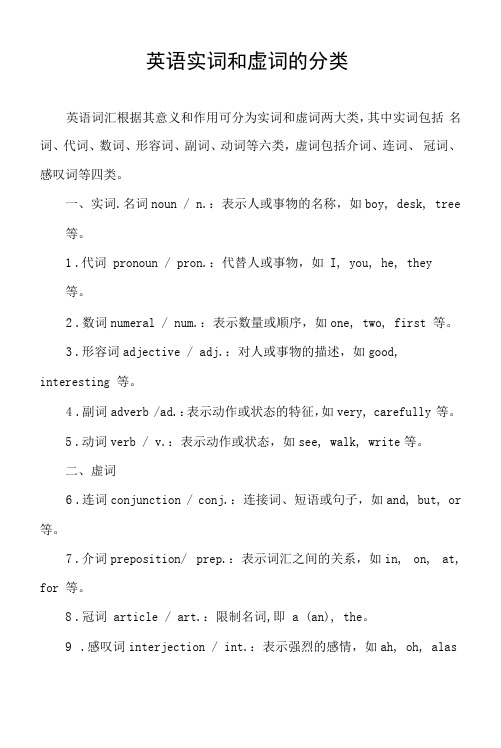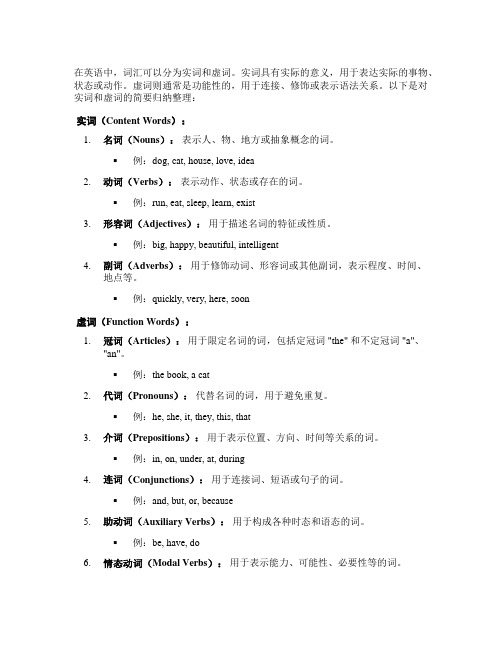英语实词与虚词
英语高考的实词与虚词.doc

英语的虚词与实词虚词<介词、代词、连词、冠词、数词>虚词没有实在意义,不能独立承担句子成分,包括冠词、介词、连词和感叹词:而且还有一个重要的特点,那就是,虚词没有词形的变化:一、冠词(art..):用在名词前,帮助说明名词。
如:a,an,the.1.不定冠词:a,an2.定冠词:the二、介词(prep.):表示它后面的名词或代词与其他句子成分的关系。
如in,on,from,above,behind, across, against, along, around, among, before, below, beneath, besides, beyond, despite, during, except, front, including, inside, like, into, next, near, of, onto, out, out of, outside, over, owning to, per, regarding, since, through, till, towards, under, unlike, until, up, upon, via, while, with, within, without…1.简单介词:是由一个单词构成的介词。
可分为三类:①普通介词:如at,by,for,from,in,of,on,to,with等②合成介词:如onto,into,within等③分词介词:如including等2.二重介词:是由两个简单介词连用而构成的介词。
如:from behind,since before,until after等3.短语介词:是由两个或两个以上的词所组成的短语构成的介词。
如:in front of,because of,instead of等三、连词(conj.):用来连接词、短语或句子。
按在句子中的作用可分为并列连词和从属连词:After, although, also, and, anywhere, as, as long as, as soon as, because, before, both…and…but, considering, either… or… even if, even so, even though,, everywhere, for, hence, however, if, in case, in order that, instead of, likewise, never, nevertheless, not only…but also, now that, once, or, otherwise, regardless, since, so, so that, such that, thus, till, until, unless, when, whenever, wherever, whether, where, while…1.并列连词①表示平行或对等关系的并列连词:and,both…and,as well as,not only…but also,neither…nor等②表示转折关系的并列连词:but,yet,while等③表示选择关系的并列连词:or,either…or等④表示因果关系的并列连词:for,so等2.从属连词:是引导从句的连词①引导名词性从句的连词:that,whether,if②引导副词性从句的连词:when,while,as,since,before,after,once,as soon as,until,till,because,now that,although,though,even if,even though,no matter how,no matter what,whatever,however,whether…or,if,unless,so long as,as long as,in order that,so that,so…that,as if,as though,than,where,wherever 等四、代词(pron.):主要用来代替名词。
英语实词和虚词的分类

英语实词和虚词的分类英语词汇根据其意义和作用可分为实词和虚词两大类,其中实词包括名词、代词、数词、形容词、副词、动词等六类,虚词包括介词、连词、冠词、感叹词等四类。
一、实词.名词noun / n.:表示人或事物的名称,如boy, desk, tree等。
1.代词 pronoun / pron.:代替人或事物,如 I, you, he, they等。
2.数词numeral / num.:表示数量或顺序,如one, two, first 等。
3.形容词adjective / adj.:对人或事物的描述,如good, interesting 等。
4.副词adverb /ad.:表示动作或状态的特征,如very, carefully 等。
5.动词verb / v.:表示动作或状态,如see, walk, write等。
二、虚词6.连词conjunction / conj.:连接词、短语或句子,如and, but, or 等。
7.介词preposition/ prep.:表示词汇之间的关系,如in, on, at, for 等。
8.冠词 article / art.:限制名词,即 a (an), the。
9.感叹词interjection / int.:表示强烈的感情,如ah, oh, alas等。
英语里有不少词可以属于几个不同词类,如sleep既可属于动词,也可属于名词;early既可属于形容词,也可属于副词;after既可属于介词,也可属于连词;since则既可以是介词和连词,也可以是副词。
如:If you want to catch the early bus, you must get up early. 你若想赶上早班车,你就得早起。
(句中的第一个early为形容词,第二个early 为副词)。
英语实词与虚词

冠词(article)是虚词,本身不能单独使用, 也没有词义,它用在名词的前面,帮助指 明名词的含义。 冠词可以说是名词的一种标志,它不能 离开名词而独立存在。表示的主语数量 或者特征。
介词(preposition)是一种用来表示词与词、 词与句之间的关系的虚词,在句中不能单 独作句子成分。介词后面一般有名词代词 或相当于名词的其他词类,短语或从句作 它的宾语。介词和它的宾语构成介词词组, 在句中作状语,表语,补语或介词宾语。 介词可以分为时间介词、地点介词、方式 介词、原因介词和其他介ห้องสมุดไป่ตู้。
名词(nouns)n.:是词性的一 种,也是实词的一种,是指 代人、物、事、时、地、情 感、概念等实体或抽象事物 的词。名词可以独立成句。 在短语或句子中通常可以用 代词来替代。 名词可以分为专有名词 (Proper Nouns)和普通名词 (Common Nouns),专有名 词是某个(些)人,地方,机构 等专有的名称,如Beijing, China等。普通名词是一类人 或东西或是一个抽象概念的 名词,如:book,sadness 等。
代词(pronoun)pron.是代替名词 的一种词类。大多数代词具有 名词和形容词的功能。英语中 的代词,按其意义、特征及在 句中的作用分为:人称代词、 物主代词、指示代词、反身代 词、相互代词、疑问代词、关 系代词、连接代词和不定代词 九种。
数词(numeral)Num.表示“多少” 和“第几”的词,叫数词。其用法 相当于名词或者形容词。数词分为 基数词和序数词两种。
连词(conjunction)是一种虚词, 它不能独 立担任句子成分而只起连接词与词,短语 与短语以及句与句的作用。 连词主要可分为4类:并列连词.转折连词. 选择连词和因果连词。 助词是附着在词,短语,句子的前面或后 面,表示结构关系或某些附加意义的虚词。 助词有结构助词,时态助词,语气助词三 种。
英语词性词类详细讲解

2. 动词(verb)
(4)情态动词: 情态动词是一种本身有一定的词义,但要与动词原形一起 使用,给谓语动词增添情态色彩,表示说话人对有关行为或事物的态度 和看法,认为其可能、应该或必要等。
must, can (could), may (might), shall (should), will (would), need, dare, have (had, has) to, used to
多音节 词和部 分双音 节词
在词前加more或most
原级 cold fast nice large big hot easy early tired
easily
比较级 colder faster nicer larger bigger hotter easier earlier more tired
little
far
old
比较级
better worse more less farther further older elder
最高级
best worst most least farthest furthest oldest eldest
4. 副词(Adverb,adv)
副词是用来修饰动词、形容词、副词、 介词、连词等单词或短语,以说明 动作性质或状态的特征的词
形容词的比较等级
三. 最高级 1. 形容词最高级的构成: 1)单音节形容词后加-est,以不发音的e结尾加-st: 2)short----shortest nice----nicest 2. 辅音字母+y结尾的双音节词,改y为i加-est: heavy----heaviest happy—happiest 3.末尾是元辅结构,且重读,双写末尾的辅音字母再加-est: big----biggest hot----hottest 4. 部分双音节词和多音节词在前面加the most: athletic----the most athletic 5. 部分形容词不规则变化: good----best
英语词性词类详细讲解

2、 动词(verb)
(2)连系动词: be动词(is, am, are, was, were, have/has been) 感官系动词(feel,smell,taste,look,sound):后面一般加形容词 变化系动词(bee, get, grow, turn) :后面一般加形容词
①只做情态动词:
must, can (could), may (might), shall (should), will (would) ②可做情态动词又可做实义动词:
need, dare ③具有情态动词特征:
have (had, has) to, used to
大家有疑问的,可以询问和交流
可以互相讨论下,但要小声点
英语词性词类详细讲解
10种英语词类
6种英语实词(有实义):名词、动词、形容词、 副词、代词、数词
4种英语虚词:冠词、介词、连词和感叹词
6种英语实词
1、名词(noun,缩写式为n)
普通名词(mon noun): 就是某一类人、事物、某种物质或抽象概念得名称。 luggage, success, traffic 专有名词(proper noun):就是特定得某人、地方或机构得名称。专有名词 得第一个字母必须大写。 Tom, China, A Tale of Two Cities, March, Saturday
I was amazed at the variety of wonderful animals、
-ing 引发情感得事物或人:
It’s an absolutely amazing city to visit、
英语实词虚词归纳整理

在英语中,词汇可以分为实词和虚词。
实词具有实际的意义,用于表达实际的事物、状态或动作。
虚词则通常是功能性的,用于连接、修饰或表示语法关系。
以下是对实词和虚词的简要归纳整理:实词(Content Words):1.名词(Nouns):表示人、物、地方或抽象概念的词。
▪例:dog, cat, house, love, idea2.动词(Verbs):表示动作、状态或存在的词。
▪例:run, eat, sleep, learn, exist3.形容词(Adjectives):用于描述名词的特征或性质。
▪例:big, happy, beautiful, intelligent4.副词(Adverbs):用于修饰动词、形容词或其他副词,表示程度、时间、地点等。
▪例:quickly, very, here, soon虚词(Function Words):1.冠词(Articles):用于限定名词的词,包括定冠词 "the" 和不定冠词 "a"、"an"。
▪例:the book, a cat2.代词(Pronouns):代替名词的词,用于避免重复。
▪例:he, she, it, they, this, that3.介词(Prepositions):用于表示位置、方向、时间等关系的词。
▪例:in, on, under, at, during4.连词(Conjunctions):用于连接词、短语或句子的词。
▪例:and, but, or, because5.助动词(Auxiliary Verbs):用于构成各种时态和语态的词。
▪例:be, have, do6.情态动词(Modal Verbs):用于表示能力、可能性、必要性等的词。
▪例:can, could, may, might, must, shall, should, will, would7.关系词(Relative Pronouns):引导定语从句的词。
英语高考地实词与虚词
英语的虚词与实词虚词<介词、代词、连词、冠词、数词>虚词没有实在意义,不能独立承担句子成分,包括冠词、介词、连词和感叹词:而且还有一个重要的特点,那就是,虚词没有词形的变化:一、冠词(art..):用在名词前,帮助说明名词。
如:a,an,the.1.不定冠词:a,an2.定冠词:the二、介词(prep.):表示它后面的名词或代词与其他句子成分的关系。
如in,on,from,above,behind, across, against, along, around, among, before, below, beneath, besides, beyond, despite, during, except, front, including, inside, like, into, next, near, of, onto, out, out of, outside, over, owning to, per, regarding, since, through, till, towards, under, unlike, until, up, upon, via, while, with, within, without…1.简单介词:是由一个单词构成的介词。
可分为三类:①普通介词:如at,by,for,from,in,of,on,to,with等②合成介词:如onto,into,within等③分词介词:如including等2.二重介词:是由两个简单介词连用而构成的介词。
如:from behind,since before,until after等3.短语介词:是由两个或两个以上的词所组成的短语构成的介词。
如:in front of,because of,instead of 等三、连词(conj.):用来连接词、短语或句子。
按在句子中的作用可分为并列连词和从属连词:After, although, also, and, anywhere, as, as long as, as soon as, because, before, both… and… but, considering, either… or… even if, even so, even though,, everywhere, for, hence, however, if, in case, in order that, instead of, likewise, never, nevertheless, not only…but also, now that, once, or, otherwise, regardless, since, so, so that, such that, thus, till, until, unless, when, whenever, wherever, whether, where, while…1.并列连词①表示平行或对等关系的并列连词:and,both…and,as well as,not only…but also,neither…nor等②表示转折关系的并列连词:but,yet,while等③表示选择关系的并列连词:or,either…or等④表示因果关系的并列连词:for,so等2.从属连词:是引导从句的连词①引导名词性从句的连词:that,whether,if②引导副词性从句的连词:when,while,as,since,before, after,once,as soon as,until,till,because,now that,although,though,even if,even though,no matter how,no matter what,whatever,however,whether…or,if,unless,so long as,as long as,in order that,so that,so…that,as if,as though,than,where,wherever等四、代词(pron.):主要用来代替名词。
英语实词和虚词的分类
英语实词和虚词的分类1 实词与虚词定义实词(Substantive)通常是指某种实体,它们可以在句子中充当名词或代词,提供具体描述,是表达主体。
因此,实词主要包括名词、代词、数词、形容词和动词。
虚词(Functional Word )是调整或维持句子结构和语序的“单词”,如连词、介词、助词和叹词等,它们的作用更多的是对句子的功能和结构起着一定程度的调节和控制作用,并不构成句子的主体性内容。
2 实词分类(1)名词(Nouns)名词是可以用来指代一个人或事物的词语。
一般名词,又称常用名词,是指专有名词和普通名词。
其中,普通名词又包括固有名词和抽象名词两类。
(2)代词(Pronouns)代词是指可以替代名词使用的词汇,通常可以代表人或物,在句子中可以承担名词的功能。
代词分为人称代词、物主代词、指示代词、相互代词、疑问代词等类型。
(3)数词(Numeral)数词是表示数量的词,指序数词和基数词,以及分数、时间等概念。
(4)形容词(Adjective)形容词是指用以提供句子中名词的额外信息,给予名词更多描述性特征的词,通常和名词紧密结合起来,作定语的角色。
(5)动词(Verb)动词是表示动作或行为的一种词语,也可表示名词所处的状态,是句子的核心结构,起着总体动作描述作用。
3 虚词分类(1)连词(Conjunction)连词是指表示逻辑关系的语汇,可以将句子中的内容逻辑上连接起来,从而调整句子结构或扩展句子含义。
(2)介词(Preposition)介词是指介于名词和其他成分之间,表达某种位置、方向、表达时间、表示属性、表示类型等相关的词,构成的复合结构称为介词短语,可以充当句子中其他成分的表语、定语或状语。
(3)助词(Auxiliary verb)助词是指句子中的一些虚词,可以帮助动词等自身不能形成谓语的功能,起到调整语序及语态的功能,常见的包括:be动词,助动词及情态动词等。
(4)叹词(Interjection)叹词是一种表达感情或加以强调、唤醒注意的虚词,可以某种程度上加强句子的色彩性和感情表达,常见的叹词有:啊、呦、嗨等。
英语高考的实词与虚词
英语的虚词与实词虚词<介词、代词、连词、冠词、数词>虚词没有实在意义,不能独立承担句子成分,包括冠词、介词、连词和感叹词:而且还有一个重要的特点,那就是,虚词没有词形的变化:一、冠词art..:用在名词前,帮助说明名词;如:a,an,the.1.不定冠词:a,an2.定冠词:the二、介词prep.:表示它后面的名词或代词与其他句子成分的关系;如in,on,from,above,behind, across, against, along, around, among, before, below, beneath, besides, beyond, despite, during, except, front, including, inside, like, into, next, near, of, onto, out, out of, outside, over, owning to, per, regarding, since, through, till, towards, under, unlike, until, up, upon, via, while, with, within, without…1.简单介词:是由一个单词构成的介词;可分为三类:①普通介词:如at,by,for,from,in,of,on,to,with等②合成介词:如onto,into,within等③分词介词:如including等2.二重介词:是由两个简单介词连用而构成的介词; 如:from behind,since before,until after等3.短语介词:是由两个或两个以上的词所组成的短语构成的介词;如:in front of,becauseof,instead of等三、连词conj.:用来连接词、短语或句子;按在句子中的作用可分为并列连词和从属连词:After, although, also, and, anywhere, as, as long as, as soon as, because, before, both…and…but, considering, either…or…even if, even so, even though,, everywhere, for, hence, however, if, in case, in order that, instead of, likewise, never, nevertheless, not only…but also, now that, once, or, otherwise, regardless, since, so, so that, such that, thus, till, until, unless, when, whenever, wherever, whether, where, while…1.并列连词①表示平行或对等关系的并列连词:and,both…and,as well as,not only…but also,neither…nor等②表示转折关系的并列连词:but,yet,while等③表示选择关系的并列连词:or,either…or等④表示因果关系的并列连词:for,so等2.从属连词:是引导从句的连词①引导名词性从句的连词:that,whether,if②引导副词性从句的连词:when,while,as,since,before, after,once,as soonas,until,till,because,now that,although,though,even if,even though,no matter how,no matter what,whatever,however,whether…or,if,unless,so long as,as long as,in order that,sothat,so…that,as if,as though,than,where,wherever等四、代词pron.:主要用来代替名词;如:all, another, any, anybody, anyone, anything, each, either, every, everybody, everything, he, her, himself, themselves, itself, I, it, me, mine, yours, neither, nobody, none, nothing, other, others, so, some, something, someone, that, these, they, this, th ose, us, what, whatever, when, whenever, who, whoever, whose, …五、感叹词interj..表示喜、怒、哀、乐等感情;如:oh,well,hi,hello1.名词前面一般用冠词,代词或介词等;①. A young man, while traveling through a desert, came across a spring of clear water. ________ water was sweet.②. Besides, shopping at this time of the year was not ________ pleasant experience.③. The young man went home ________ a happy heart.④. Mo Yan won the Nobel Prize for ________ great works.⑤._______ time going by, the boy has grown into a strong man.⑥.The girl danced ______ the music of Paul Mallrat’s band.2. 缺主语或宾语,一般填代词;①. Here are two bags. The blue ________ is mine.②. Suddenly the wall moved——________ was made of trees.③. New technologies have made _________ possible to turn out new products faster.④._________ is important for our students to exercise one hour every day.3.并列的两个或多个单词,短语,或句子之间设空,一般填入并列连词and, but, or等;①. Each winner receives a gold medal, a diploma ________ a sum of money.②. He was very tired from doing this for a whole day, ________ he felt very happy.③. Which do you prefer, folk music ________ pop music4.两句之间,如果不是并列句,则很可能是主从句,因此需要填入从属连词what, which, who, how, when等;比如宾语从句,定语从句或者是状语从句的连接词;这种空格需要同学们根据句子结构,分析到底是什么从句,从而选择合适的从属连词;①. Finally he reached a lonely island ________ was completely cut off from the outside world.②. ________hard your try, it is difficult to lose weight.③. If you happen to get l ost in the wild, you’d better stay ________ you are.④. ________we have enough evidence, we cannot win the case.⑤. Some children want to challenge themselves by learning a language different from______ their parents speak at home.⑥.At the same time, there had been a growing number of overseas students ________came back to China after study.⑦.My face turned red on hearing ________ my mother said.⑧._______ she couldn’t understand was _______ fewer and fewer students showed interest in her lessons.⑨.It was the ability to do the job ____ matters not where you come from or what you are.⑩.No sooner had she gone out___________ a student came to visit her.实词是指有实在意义,能独立承担句子成分的词,包括名词、代词、形容词、副词、动词和数词;而且还有一个重要的特点,那就是,实词有词形的变化,尤其是动词,可谓变化多端:1、名词n.:表示人、事物、地点或抽象概念的名称;如:boy,morning,bag,ball,class,orange.2、形容词adj..:表示人或事物的性质或特征;如:good,right,white,orange .3、数词num.:表示数目或事物的顺序;如:one,two,three,first,second,third,fourth.4、动词v.:表示动作或状态;如:am,is,are,have,see .5、副词adv.:修饰动词、形容词或其他副词,说明时间、地点、程度等;如:well,very,here,often,quietly,slowly.构词法 Word Formation在英语中词的构成方式主要有三种:合成、转化和派生;一、合成 Compounding 两个或更多的词合成一个词;方式:1. 直接写在一起; 2. 用连字符-连接; 3. 由两个分开的词构成;1 合成形容词2合成动词3合成名词4合成副词however, maybe, wherever, whenever, forever5合成代词whoever,, whatever, everyone, nobody, myself, something, anything,二、派生 Derivation注意: -ese, -ian, -ist 既可以构成名词,又可以构成形容词;三、转化 Conversion: 指一个词不变化词形,而由一种此类转化为另一种词类或几种词类;1. 名词和动词之间的转化telephone电话——打电话, mirror镜子——像镜子一样反映, drink喝——饮料, record录音——记录, name, date, hand, study,2. 形容词转化为动词 perfect完美的——使完善3.名词转化为形容词副词 front前面——前面的4.形容词转化为名词 chief 主要的——首领-alarrive —n. __________ chemistry —adj. __________ memory—n. __________—v. __________ music—adj. __________—n. __________ survive—n. __________—n. __________ try—n. __________-ance / -enceabsent —n. __________ allow—n. __________appear—n. __________—反义n. __________ assist—n. __________—n.__________consequence—n. __________ convenient —n. __________—反n.__________different —n. __________ evident —n. __________exist —n. __________ guide —n. __________ important —n. __________depend —adj. __________ —n. __________ —反n. __________insure —n. __________ intelligent —n. __________ patient —n. __________ significant —n. __________ silent —n. __________ violent —n. __________-ary / -erybrave—n. __________ discover—n. __________ rob—n. __________ scene—n. __________ slave—n. __________-ableadmire —adj. __________ change —adj. __________ comfort —adj.__________enjoy —adj. __________ reason —adj. __________ rely —adj.__________suit —adj. __________ value —adj. __________-mentAchieve —n. __________ adjust —n. __________ advertise —n. __________ agree —n. __________ —反n. __________amuse —n. __________ appoint —n. __________argue —n. __________ arrange —n. __________courage —v. __________ —n. __________entertain —adj. __________ —adj. __________ —n. __________equip —n. __________ judge —n. __________employ —n. __________ —反n. __________-nessdark —n. __________ happy —n. __________ill —n. __________ kind —n. __________sad —n. __________ weak —n. __________1、有提示词这类题首先需要我们根据上下文,分析句子成分,确定空格所需要的词性,再根据前后文确定词形;1如果要填入动词,我们需要判断到底是谓语动词和非谓语动词;如果缺谓语动词,就要考虑到时态和语态的变化;若句中已有谓语动词,又不是并列谓语时,那么我们应该填入非谓语动词,这时我们需要确定到底是to do, doing还是done的形式;①. For example, I ________ order a digital camera online the other day and saved about $50.②. When I die, I ________ give everything to you.③. On their return, the father asked his son ________explain what he had learnt.④. They are animals ________ live in the sea.⑤. He likes reading books ________ write by Lu Xun.⑥. The water will be further polluted unless some measures ______ take.⑦. The speaker raised his voice but still couldn’t make himself______ hear⑧. _________play computer games is what boys like best.⑨. It is high time you ______ work hard at English.⑩. If you __________ come yesterday, you would have met Andy Liu.2如果需要填入名词,我们则需要判断是否有单复数和所有格的变化;①. My first ________ impress of him is that he was a kind and thoughtful man.②. These people have made great ________ contribute to China with their work.③.You’ll want to know your body language is saying and how to interpret other _______people. 3如果需要填入形容词、副词;首先,我们要确认到底是填形容词还是副词;形容词一般用来修饰名词,代词,或作表语;副词一般用来修饰动词,形容词,副词或整个句子;其次,我们还要考虑是否需要变成比较级或最高级;①. Before the trip I thought we were rich, but today I learnt who is ________ true rich.②. He must be ________ mental disabled.③. His teacher took a deep drink, smiled ________ warm, and thanked his student very much for the sweet.④. ________ Fortune, nobody was injured and no buildings were destroyed.⑤. Some people say that the oldest child, who are smart and strong-willed, are very likely to be ________ succeed⑥. The winning car reached a speed of forty miles an hour——much ________ fast than any of its rivals对手.三、语篇练习一Most students do an IQ test early in their school career. Even if they never see their results, they feel that their IQ is ____1____ determines how well they are goingto do in life. When they see other students doing ___2____ good than them, they usually believe that those students have ____3____ higher IQ and that there is nothing they can do to change the fact. However, new research ____4____ EQ suggests that success is not ____5____ simple the result of a high IQ.While your IQ tells you how____6____ intelligence you are, your EQ tells you how well you use your intelligence. Professor Salovery, ____7____ invented the term EQ, gives the following description: at work, it is IQ that ____8____ get you promoted. Supported by his academic research, Professor Salovery suggests that when_____9_____ predict someone’s future success, their character, as ____10____measure by EQ tests, might actually matter more than their IQ.二Paula interviewed two ____1______ teenage, Emily and Jerry, for a program ___2___ family life. There are three people in Emily's family and five in Jerry's family, so Jerry sometimes feels _____3_____ crowd in their little flat. Emily has a lot of possessions, but Jerry doesn't have many. Emily is not___4_____ expect to do housework, but Jerry is. They both like to do things with their family. But Emily's parentsare____5_____ business, so they usually do their own____6____ person things. Jerry and his family do things together. His family always comes to school events. Emily's parents don't usually set rules for her ___7___ Jerry's parents set some rules for him. Emily likes her new flat, but she ___8___ feel lonely when her parents are away ___9___home. Jerry loves his family very much. They have a close ___10___ relation and always support each other.三Good afternoon, parents and teachers. Thank you for___1_____attend this meeting. Last weekend, one of____2__ we students went to hospital. The student played computer games on the Internet all day Saturday without stopping___3____ eat, drink or sleep. Finally, he became very ill. Some students play computer games for too long. This is__4___ serious problem. In the past, students used ____5____ play outside more often, ___6___ now they spend more time___7__play computer games. This is bad for their health. Tomorrow we will have some experts here to talk to the students___8___ the bad effects of playing computer games. They will also give some advice on how___9____ use computers for studying. I hope we can all work together to stop students from spending too___10___ many time playing computer games.四Some people have a very poor sense of _____1_____ direct. Unluckily, I am one of them.I _____2_____ visit a place many times but I may still get lost there the next time.____3______I was a little girl, I never dared to ask strangers the way. And so I used to walk round in circles and hope that by chance I would get to the place I was going to.Now, I am no longer too shy _____4_____ ask people for directions, but I often receive helpless or even wrong information. So I try to avoid _____5_____ give people wrong directions.If anyone ever asks me the way somewhere, I would say,” Sorry, I am _____6_____stranger h ere.”Once on my way ______7____work I was stopped by a man. He asked me if I could tell him the way to the Friendship Building. I gave him my usual reply. But just as I walked on only a few steps, I realized____8______ he had asked the way to my office building. However, I had no time to return back and look for him. I was rushing to meet with someone at my office and I didn't want to keep him waiting. When I just got to my office, the secretary showed in the man _____9_____ had asked me for directions. Imagine how embarrassed I was and how _____10_____ surprise he was when we saw each other at the first sight五I am now a good student in my class.___1 ___ you don’t know that whenI started to learn senior English in the beginning,I found it difficult and quite different from ___2_____ we had learned in junior school.Now I still remember a teacher who taught me at that time. ___3__ teacher is a good teacher because she always tries her best to be the one whose classes are more active and lively with some stories and ___4___ example._____5_____the help of my teacher, I realized the ____6_______important of English,so I was ___7____determine to learn English well. My teacher suggested that we ___8_____ read more if we want to improve our English, so every day I would do some English reading. She also told us lessons___9 learn in classes could help us deal with exams, but even more valuable were the lessons learned in extra-curricular activities in school. I like my English teacher very much.Now I have made 10___great progress in my English study that I am more interested in learning it than before.。
英语实词和虚词的区别 及例子
英语实词和虚词的区别及例子
英语中的实词和虚词是语法学中的两个重要概念,用于描述单词在句子中的不同作用和意义。
实词(Content Words)是指具有实际意义并能独立存在于句子中的词,通常是名词、动词、形容词和副词等。
实词能够传达具体的概念、动作、状态或描述,对句子的意义和结构起到重要的作用。
以下是一些实词的例子:
- 名词:dog(狗)、book(书)、computer(电脑)
- 动词:run(跑)、eat(吃)、sleep(睡觉)
- 形容词:happy(快乐的)、tall(高的)、beautiful(美丽的)- 副词:quickly(快速地)、loudly(大声地)、carefully(小心地)
虚词(Function Words)是指在句子中没有独立意义,主要用于表示语法关系、引导连接或限定词义的词。
虚词通常是冠词、介词、连词和助动词等。
虚词在句子中的作用是辅助实词的表达,起到连接、修饰或限定的作用。
以下是一些虚词的例子:
- 冠词:a(一个)、the(这个)、an(一)
- 介词:in(在)、on(在…上)、at(在…处)
- 连词:and(和)、but(但是)、or(或者)
- 助动词:is(是)、have(有)、will(将)
虚词和实词的区别在于其在句子中的具体作用和意义。
实词具有独立的意义,能够传达具体的概念或动作,而虚词则起到连接、修饰或限定实词的作用。
理解实词和虚词的区别有助于我们正确理解和运用英语的语法规则。
- 1、下载文档前请自行甄别文档内容的完整性,平台不提供额外的编辑、内容补充、找答案等附加服务。
- 2、"仅部分预览"的文档,不可在线预览部分如存在完整性等问题,可反馈申请退款(可完整预览的文档不适用该条件!)。
- 3、如文档侵犯您的权益,请联系客服反馈,我们会尽快为您处理(人工客服工作时间:9:00-18:30)。
Thank you for watching!
Good-bye!
形容词(adjective)adj.是很多 语言中均有的主要词类中的 一种。主要用来修饰名词的 词,表示事物的特征。形容 词用来修饰名词或代词,表 示人或事物的性质、状态, 和特征的程度好坏,与否。
5.副词(adverb)adv.: 是一种用来修饰动词、形容词、全句的词, 说明时间、地点、程度、方式等概念的词。 副词是一种半虚半实的词。副词可分为:时 间副词、地点副词、方式副词、程度副词、 疑问副词、连接副词、关系副词、频率副词 和说明性副词等。
代词(pronoun)pron.是代替名词 的一种词类。大多数代词具有 名词和形容词的功能。英语中 的代词,按其意义、特征及在 句中的作用分为:人称代词、 物主代词、指示代词、反身代 词、相互代词、疑问代词、关 系代词、连接代词和不定代词 九种。
数词(numeral)Num.表示“多少” 和“第几”的词,叫数词。其用法 相当于名词或者形容词。数词分为 基数词和序数词两种。
6.动词(Verb)v.: 动词,就是用来形容或表示各类动作的词汇。 基本上每个完整的句子都有一个动词,要表 示第二个动作时可使用不定词、动名词、对 等连接词、从属连接词或增加子句等方承担句子成分,包括冠词、 介词、连词和感叹词:而且还有一个重要的特点,那就是, 虚词没有词形的变化。
冠词(article)是虚词,本身不能单独使用, 也没有词义,它用在名词的前面,帮助指 明名词的含义。 冠词可以说是名词的一种标志,它不能 离开名词而独立存在。表示的主语数量 或者特征。
介词(preposition)是一种用来表示词与词、 词与句之间的关系的虚词,在句中不能单 独作句子成分。介词后面一般有名词代词 或相当于名词的其他词类,短语或从句作 它的宾语。介词和它的宾语构成介词词组, 在句中作状语,表语,补语或介词宾语。 介词可以分为时间介词、地点介词、方式 介词、原因介词和其他介词。
连词(conjunction)是一种虚词, 它不能独 立担任句子成分而只起连接词与词,短语 与短语以及句与句的作用。 连词主要可分为4类:并列连词.转折连词. 选择连词和因果连词。 助词是附着在词,短语,句子的前面或后 面,表示结构关系或某些附加意义的虚词。 助词有结构助词,时态助词,语气助词三 种。
实词与虚词
Content words and function words
实词是指有实在意义, 能独立承担句子成分 的词,包括名词、代 词、形容词、副词、 动词和数词。而且还 有一个重要的特点, 那就是,实词有词形 的变化,尤其是动词, 可谓变化多端
1、名词(n.) 2、代词(pron.) 3、形容词(adj.) 4、数词(num.) 5、动词(v.). 6、副词(adv.)
名词(nouns)n.:是词性的一 种,也是实词的一种,是指 代人、物、事、时、地、情 感、概念等实体或抽象事物 的词。名词可以独立成句。 在短语或句子中通常可以用 代词来替代。 名词可以分为专有名词 (Proper Nouns)和普通名词 (Common Nouns),专有名 词是某个(些)人,地方,机构 等专有的名称,如Beijing, China等。普通名词是一类人 或东西或是一个抽象概念的 名词,如:book,sadness 等。
